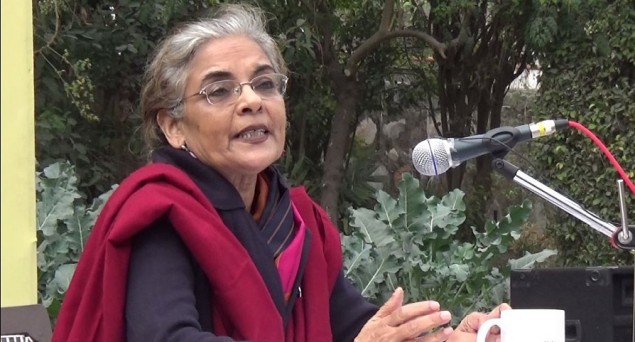Waquar Hasan, IndiaTomorrow.net,
New Delhi, Jan 17: Prominent social scientist and writer Professor Zoya Hasan took on the Modi government for its intolerant approach toward its dissenters and described it as “the most anti-intellectual government”.
“In my understanding this is, perhaps, the most anti-intellectual government that we ever had since Independence. And which is why the attack on intellectual freedom, which is why they responded in the way to the award wapsi or the reactions of. Or if you like the protest from artist, academics or historians, filmmakers and so on so forth. So in the last nineteen months, there has been obviously a great deal of intolerance, systematic suppression of dissent and everyday there are incidences of censorship, perhaps even more significantly self-censorship,” said Zoya, Dean of School of Social Science at Jawaharlal Nehru University, while speaking at Guftgu event organized on Saturday by Jamia Collective, a civil initiative for creating open space for dialogues.
“The three and four central concepts till date, as I think, secularism, democracy, equality and justice of our Indian project are being redefined in different ways in last 18 and 19 months. That redefinition is like one step forward and two steps backward. The entire efforts are that they are really testing the waters. There are three things which are central to what is being attempted over the past 18 and 19 months. One is testing the waters, second changing the public discourse and third using the state, agencies of the state in this process of change which as I said is really an attempt to change national identity, to change the very conception of citizenship.
“In India, what are the mobilization strategies of political parties as they congregate people, in the way they gain support of people, this entire process is communal. If we observe BJP or Asaduddin Owaisi’s party, the entire process of mobilization of these parties is very clearly communal agenda.”
“At this time, the biggest issue is dissent or intolerance. The second issue is minorities. State secularism as a normative ideal was established by the constitution of India. The constitution did not recognize an official religion. It did not even recognize secularism officially. But it was widely accepted that is established a democratic citizen-central idea of state secularism,” said Zoya.
Also Read: Guftgu — Initiative to create a ‘talking’ space in an ‘intolerant’ atmosphere
“Congress made so much compromises that the entire ideology of secularism rather weakened and discredited. This created a ground by which BJP grew up. There is no doubt in it that for last three decades, especially 1980 and 90, secular parties made secular compromises for their electoral advantages.”
Supreme Court clearly said that Secularism is an integral part of constitution and whole political system. In fact in SR Bommai case Supreme Court introduced the new idea the basic structure of the constitution. It is the first time in SR Bommai case when it has been said that Secularism is the part of basic structure of the constitution. Which in effect established secularism as a core constitutional value which cannot be changed and it was taken for granted that it is very part of political system and it is part of principal governance. But for last years, the entire effort is being made to change it. Now, my point is really that if you weaken or if you dilute secularism in anyway, we are going to be weakening democracy because, in the Indian case democracy and secularism are intrinsically linked. This is not necessarily the case of all countries. The point is that India’s national identity can only survive on the basis of secularism.
“So there is a great deal of talk therefore development of manufacturing rapid industrial expansion of employment of generating millions of jobs through the make in India and skill in India programs and so on so forth. But at the end of nineteen now almost twenty months clearly not much has been delivered. What we have instant is an explosion of cultural politics, targeting freedom of expression, freedom of religion and intellectual freedom.”
“The most tragic and the most significant were the attacks on three rationalists. As we talk about what is happening to minority rights, I think we should not for a moment forget those attacks. I would say they were even more deeper attacks. Because the attacks on minorities are obvious but even more deeper are the attacks on the reasons and on the rationality. You cannot build a modern society or a modern state or you can’t have modern progress without reason, rationality and scientific temper. And that’s really what is under attack.
At the Guftgu event in the last two months, eminent personalities like Ashok Vajpayee and Prof Apoorvanand have spoken at the subject at length.





